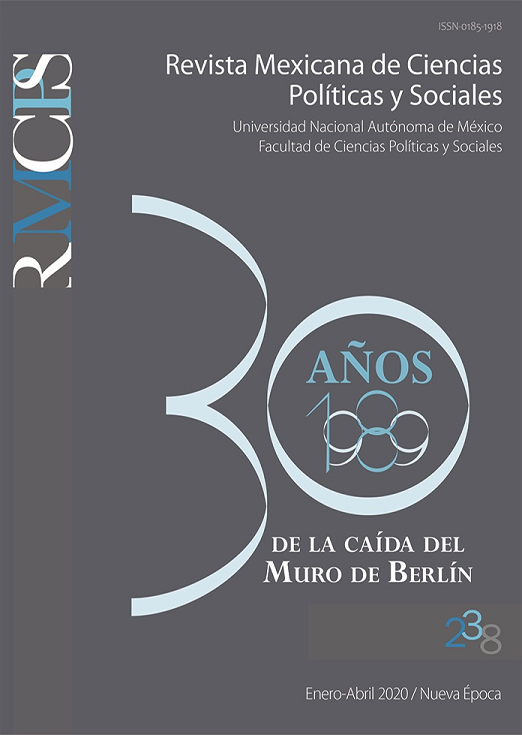Scope and Meaning of the Wall in the 20th Century. The Resurgence of a Triple European Centrality
Main Article Content
Abstract
Downloads
Article Details
Citas en Dimensions Service
References
Badie, Bertrand (2016) Nous ne sommes plus seuls au monde. París: La Découverte.
Badie, Bertrand (2018) Quand le sud réinvente le monde. Essai sur la puissance de la faiblesse París: La Découverte.
Bauer, Bence y András Hettyey (2014) “25 Years of German-Hungarian Relations since 1989, the Year the Iron Curtain Fell” Konrad Adenauer Stiftung International Reports: 7-26.
Chacón, Rodrigo (2019) “¿Imperios por doquier?” Foreign Affairs Latinoamérica, 19(4): 2-10.
Colomer, Josep M. (2016) The European Empire. California: Createspace.
Crawford, Beverly (1996) “Explaining Defection from International Cooperation: Germany’s Unilateral Recognition of Croatia” World Politics, 48(8): 482-521.
Fukuyama, Francis (1992) The End of History and the Last Man. Toronto: Maxwell Macmillan.
Goodliffe, Gabriel (2019) “La Unión Europea de imperio liberal a hegemónico” Foreign Affairs Latinoamérica, 19(4): 35-43.
Hazony, Yoram (2018) The Virtue of Nationalism. Nueva York: Basic Books.
Heisbourg, François (2015) “The Strategic Implications of the Syrian Refugee Crisis” Survival, 57(6): 7-20.
Ignatieff, Michael (2003) “The American Empire; The Burden” The New York Times Magazine. 5 de enero.
Kimball, Spencer (2010) “The Balkan Dilemma: Germany Returns to Military Action” Deutsche Welle [en línea]. 28 de diciembre. Disponible en: https://www.dw.com/en/the-balkan-dilemma-germany-returns-to-military-action/a-6309598 [Consultado el 10 de octubre de 2019].
Kotkin, Stephen (2015) “The Resistible Rise of Vladimir Putin: Russia’s Nightmare Dressed Like a Daydream” Foreign Affairs, 94(2): 140-153.
Kotkin, Stephen (2019) “What Mueller Found… and did not Find- About Trump and Russia” Foreign Affairs, 98(4): 62-79.
Levasseur, Sandrine (2019) La genèse de l’euro: retour aux sources en OFCE L’économie européenne 2019. París: La Découverte.
Marks, Gary (2012) “Europe and its Empires: From Rome to the European Union” Journal of Common Market Studies, 50(1): 1–20.
Navarrete, Jorge Eduardo (coord.) (2011) La huella global de China. Interacciones internacionales de una potencia mundial. Ciudad de México: Centro de Investigaciones Interdisciplinarias en Ciencias y Humanidades, UNAM.
Sberro, Stéphan (2019) “El regreso de los imperios perdidos del siglo XIX” Foreign Affairs Latinoamérica, 19(4): 19-26.
Sevilla, Christina R. (1995) Explaining the September 1992 ERM Crisis: The Maastricht Bargain and Domestic Politics in Germany, France and Great Britain. Working Paper. Universidad de Pittsburg.
Silber, Laura (1991) “Germany Recognizes Croatia and Slovenia” The Washington Post. 24 de diciembre.
Van Oudenaren, John (2011) “European Integration, Progress and Uncertainty” en Tierskyand, Ronald y Erik Jones (eds.) Europe Today: A Twenty-first Century Introduction. Lanham: Rowmand and Littlefield.
Wieder, Thomas (2019) “Orban et Merkel célèbrent ensemble la fin du rideau de fer sans insister sur leurs divergences” Le Monde. 19 de agosto.
Zakaria, Fareed (2019) “What Happened to the American Century” Foreign Affairs, 98(4): 10-17.

La Revista Mexicana de Ciencias Políticas y Sociales publicada por la Universidad Nacional Autónoma de México se distribuye bajo una Licencia Creative Commons Atribución-NoComercial-SinDerivar 4.0 Internacional.
Basada en una obra en http://www.revistas.unam.mx/index.php/rmcpys/
La RMCPyS autoriza a sus colaboradores que suban una copia de sus trabajos publicados en sus webs personales o en cualquier repositorio de acceso abierto, siempre y cuando se mencione específicamente a la Revista Mexicana de Ciencias Políticas y Sociales como fuente original de procedencia, citando el año y número del ejemplar respectivo y añadiendo el enlace a la página web donde este órgano editorial puede ser consultado in toto, de manera abierta y gratuita en: <www.revistas.unam.mx/index.php/rmcpys>.
Las y los lectores tienen libertad para:
Compartir, copiar y redistribuir el material en cualquier medio o formato.
El licenciante no puede revocar estas libertades en tanto usted siga los términos de la licencia.
De acuerdo con los siguientes términos:
- Atribución: la/el lector/a debe reconocer el crédito de una obra de manera adecuada, proporcionar un enlace a la licencia, e indicar si se han realizado cambios. Puede hacerlo en cualquier forma razonable, pero no de forma tal que sugiera que tiene el apoyo del licenciante o lo recibe por el uso que hace.
- No comercial: la/el lector/a no puede hacer uso del material con fines comerciales.
- Si se mezcla, transforma o se desarrolla a partir de la obra licenciada, no se permite la distribución del material modificado.
Cargos por gestión de artículos
La Revista Mexicana de Ciencias Políticas y Sociales NO cobra tarifas por recibir, procesar o publicar los artículos (Article Processing Charge [APC]) enviados por los autores.





